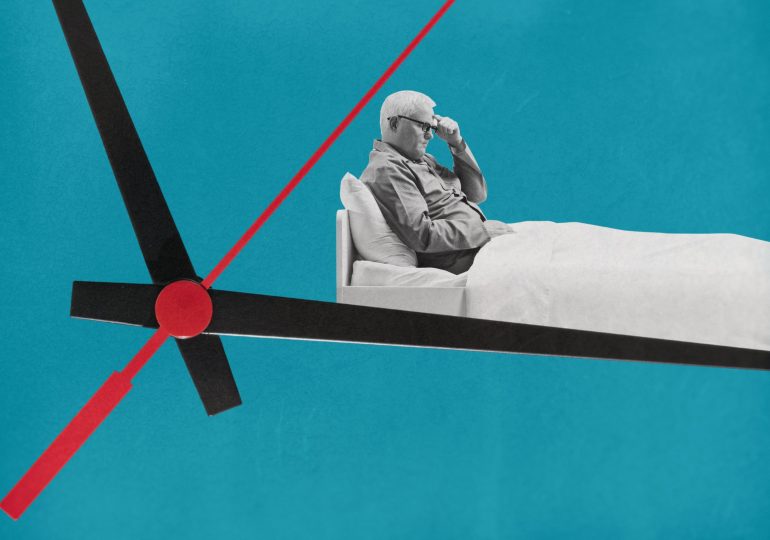In a culture that’s highly goal-oriented, yet another form of performance anxiety has emerged: It’s called orthosomnia, and it refers to an unhealthy preoccupation with getting the right amount of sleep as well as the right stages of sleep.
The term was coined in 2017 by researchers who were seeing a growing number of patients seeking treatment for self-diagnosed sleep disturbances based on data provided by their sleep trackers, explains Kelly Baron, a clinical psychologist who leads the behavioral sleep medicine program at the University of Utah and lead researcher on the paper that named the term. “Ortho” means straight or correct, and “somnia” means sleep. The researchers chose this term because of its similarity to a condition called orthorexia, an unhealthy preoccupation with healthy eating.
[time-brightcove not-tgx=”true”]
Orthosomnia is not an actual medical diagnosis, but it is a phenomenon that has risen alongside the popularity of sleep trackers.
“In a clinical setting, we were seeing more and more people with insomnia coming in with sleep-tracking devices,” explains Baron. “They were believing the device more than their doctor” or even their subjective sense of how they had slept.
After reviewing a series of case studies, she and the other researchers on the paper concluded that some of the people who were unnecessarily concerned about their sleep quality were too caught up in their sleep-tracker data and were on a “perfectionistic quest for the ideal sleep in order to optimize daytime function.”
Read More: Do Hangover Prevention Supplements Really Work?
But many people don’t realize that “trackers are not medical devices—the accuracy is always suspect,” says Michael Breus, a clinical psychologist and founder of SleepDoctor.com. “Sleep is measured by brain waves, so unless you have electrodes attached to your head, you’re not going to have your brain waves measured.” That’s what’s done with polysomnography, a lab-based sleep study that’s considered the gold standard for diagnosing sleep disorders.
By contrast, sleep trackers that are worn on the wrist typically rely on pulse or heart rate “to guesstimate” the brain’s electrical activity during sleep (which an electroencephalogram, or EEG, would reveal in a sleep lab), says Breus. And sleep-tracker rings that are worn on your finger use body temperature, body movement, heart rate, and heart rate variability (fluctuations in the time between heartbeats) to gauge sleep quality.
Unfortunate side effects of orthosomnia
The trouble with having an unhealthy fixation on sleep metrics is that it can fuel anxiety and exacerbate insomnia in those who have it. People who have orthosomnia may feel nervous about going to sleep, staying asleep, or achieving certain sleep metrics such as deep sleep, REM sleep, sleep latency (how long it takes to fall asleep), or sleep efficiency, the percentage of time you actually spend asleep as opposed to lying in bed. (All of these metrics are included on certain sleep trackers.) As a result, they may end up lying awake longer at night, Baron says.
Read More: Am I Peeing Too Much?
“Sleep is one of those things you can’t perfect,” Baron says. “Some nights you can do everything right and still not get a good night’s sleep. You can’t over-control it.”
But that doesn’t stop some people from trying. “People over-focus on everything related to sleep because of the availability of data,” Breus says. And they often share it with other people. “It becomes a point of discussion—what used to be called water-cooler talk,” he adds.
How to control orthosomnia
Rather than obsessing about the minutiae of your sleep, it’s better to think about your goals for improving your shuteye, Breus says: Do you want to sleep longer? Wake up feeling better rested? Something else?
Then, you can use the feedback you get from a sleep tracker to modify your behavior—including your eating, drinking, and stress-management habits and your use of electronic devices in the evening—to try to set yourself up for a better night’s sleep. “Self-monitoring and goal-setting are cornerstones of any sort of behavior change,” Baron says.
But there’s no need to check the data from your sleep tracker every day. Instead, it’s better to look for trends or big variations once a week or compare your weekday data to your weekend data, Breus says. “That’s how everybody can utilize a tracker without becoming cuckoo about it.”
Read More: Should You Take Amino Acid Supplements?
To improve your sleep quality, make an effort to get on a regular schedule, with consistent bedtimes and wake-up times, Baron says. In the morning, pay more attention to how you feel than the numbers on your tracker’s app.
If, despite taking these steps, you continue to find yourself obsessing over your sleep data or feeling anxious about your sleep, it may be time to take a break from using a tracker. “For some people, paying too much attention backfires,” Baron says. “How you sleep really should be about how you feel.”
If you can’t resist monitoring your sleep quality, you may be better off keeping a written sleep diary, says Breus. In the morning, write down your bedtime and wake-up time, how many times you woke up during the night, and how you’d rate your sleep quality on a scale from one to five.
If anxiety about sleep continues to haunt you, you may benefit from cognitive behavioral therapy for insomnia (CBT-I) with a trained therapist, an online course, or an app. CBT-I uses various strategies to change people’s sleep-related habits and attitudes that might be perpetuating their sleep troubles. It’s been shown to be highly effective.
Leave a comment





